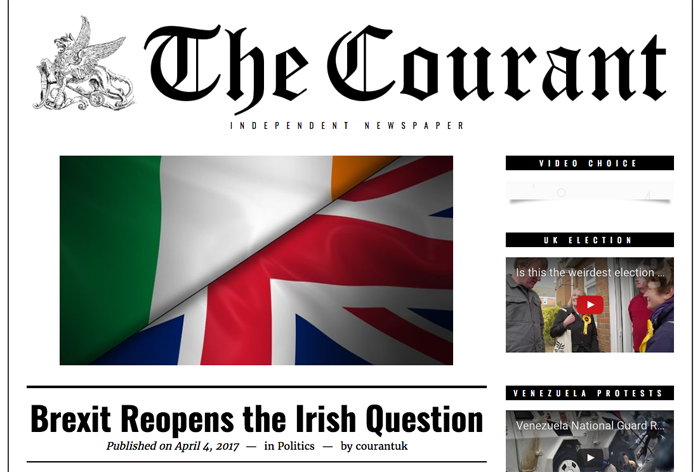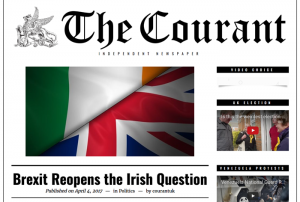WordPress database error: [You have an error in your SQL syntax; check the manual that corresponds to your MySQL server version for the right syntax to use near 'FROM wp_posts
WHERE 1=1 AND ((wp_posts.post_type = 'post' AND (wp_posts.' at line 2]SELECT SQL_CALC_FOUND_ROWS all
FROM wp_posts
WHERE 1=1 AND ((wp_posts.post_type = 'post' AND (wp_posts.post_status = 'publish')))
ORDER BY wp_posts.post_date DESC
LIMIT 0, 10

This article was published in the independent publication, The Courant, 4 April 2017

Click here to read the article on The Courant website
It used to be called the Irish Question, and was the biggest issue in British politics. It even caused a mutiny in the British Army and a constitutional crisis in Parliament. Then it disappeared off the radar screen. Suddenly it’s back again – to the dismay of some, the bewilderment of many and the consternation of the few who realise what it entails.
Irish unity is once again a live political issue.
From Dublin it is not hard to divine the root cause of this sudden re-awakening of what seemed a long settled matter. It is Brexit.
Twenty years ago, the British and Irish governments, with the active engagement of the US President and the support of the EU, brokered a peace deal between the Unionist and Nationalist populations in Northern Ireland. Known colloquially as the Good Friday Agreement, it committed the two peoples to permanent power sharing in place of the one-party rule that had proven such a catastrophic failure. A British Irish international treaty, solemnly lodged as such with the United Nations, underwrote the deal and set up an elaborate institutional framework that covered all aspects of the relations between Ireland and Britain, Ireland and Northern Ireland and the two communities in Northern Ireland. This tripartite agreement with inter-locking parts reset the Anglo-Irish Treaty of 1922, which had originally partitioned the island, and it appeared to put the Irish Question to rest for the foreseeable future.
Now it is endangered by Brexit.
 The timing and the circumstances could hardly be worse. The timing is disastrous because the two communities in Northern Ireland are again at loggerheads, so much so that the power sharing arrangement recently collapsed amid mutual recrimination and remains to be put back together again. The circumstances could hardly be worse because the recent election in Northern Ireland brought into plain sight something which would have been best left unseen, at least for the present. In essence, the demographic balance between Unionists and Nationalists has been shifting inexorably in favour of the Nationalists and, as the election results showed, the two communities are now roughly equal in size. In fact, they won the same number of seats in the Northern Ireland Assembly. Suddenly, it appears possible that next time around the Nationalists will win a majority of seats.
The timing and the circumstances could hardly be worse. The timing is disastrous because the two communities in Northern Ireland are again at loggerheads, so much so that the power sharing arrangement recently collapsed amid mutual recrimination and remains to be put back together again. The circumstances could hardly be worse because the recent election in Northern Ireland brought into plain sight something which would have been best left unseen, at least for the present. In essence, the demographic balance between Unionists and Nationalists has been shifting inexorably in favour of the Nationalists and, as the election results showed, the two communities are now roughly equal in size. In fact, they won the same number of seats in the Northern Ireland Assembly. Suddenly, it appears possible that next time around the Nationalists will win a majority of seats.
The significance of this population shift lies in the fact that Northern Ireland was created by a British government to accommodate the Unionist population’s desire to remain part of the United Kingdom and not become part of an independent Ireland. More accurately, it accommodated the preponderance of Unionists on the island who were packed into its North-Eastern corner. A sectarian head-count was explicitly invoked as the raison d’être for establishing the new statelet, leading to a “Protestant Parliament for a Protestant People” as it was openly described by one of its founders.
That worked after a fashion when the population ratio was roughly two to one in favour of the Unionists. It worked less convincingly as the ratio slowly tilted towards the Nationalists, and won’t work at all when the ratio is reversed. In fact, the Good Friday Agreement anticipated that possibility and provided a pathway towards Irish unity by way of referendum if the electorate in Northern Ireland so decided. The two governments solemnly undertook to abide by a majority vote in favour of unity and that commitment is enshrined in the Agreement as lodged with the UN. The formula was ingenious as it reassured the Unionists (who thought they were in a permanent majority) and placated the Nationalists (who expected to become one eventually). It bought time and it brought peace.
In normal circumstances, assuming there is anything in politics that can be described as normal, a showdown with demographic realities would not have occurred for years to come. In the meantime, continuing peace and prosperity, the products of the Good Friday Agreement, would have gradually infused the political system with normal democratic values and allowed peace to bed down. At least, that was the plan. But then Brexit happened.
Now, if the timing and circumstances could hardly be worse from an Irish perspective, then the way it will be implemented is even worse again. Brexit will shatter the status quo for one simple reason. Despite the optimistic rhetoric of PM May’s Article 50 letter, it will re-introduce the border between the Republic and the North, a border that had literally disappeared as a result of joint membership of the EU. Currently it’s invisible. Customs posts have gone, and so too security checks. People come and go as they wish. But a hard Brexit means that the border will be back for that’s the logical consequence of the UK leaving the EU and the Republic remaining. In popular parlance, partition will be back. Nothing could be more odious to the nationalist mind, North and south. After all, partitioning the island in 1922 had led to a civil war in what was then the Irish Free State but is now the Republic, and to prolonged discrimination in the North.
So, the very threat of partition is anathema. For the Northern Nationalists, the psychological reaction, and hence their political response, was instant and clear-cut. They are not going back to the status quo ante when they were cut off from their compatriots in the Republic and treated as second class citizens in what they regarded as their own country. For the Republic, the political class is determined to enforce the Good Friday Agreement to the letter.
The Taoiseach, Enda Kenny, who is the most experienced and wily politician in the Republic (and a veteran of EU politics in which he revels) has taken the high ground by invoking the Good Friday Agreement and insisting that it be recognised and incorporated into whatever divorce settlement is agreed between the EU and the UK. He has referenced the reunification of Germany as an analogue for Northern Ireland’s incorporation into the Republic and, consequently, into the European Union in a seamless transition from one jurisdiction to another. The point is well made, understood widely in Ireland, and accepted in the EU. It means that Irish unity is back on the agenda, and that means back on the British agenda. It will be another headache for Mrs May, adding to that caused by Scotland.
It would have been best to let sleeping dogs lie. For all the alarms and excursions in Northern Ireland the situation there could have been contained indefinitely and a new constitutional settlement would have emerged at its own pace. But Brexit changed that overnight, and has disinterred ancestral memories. It is seen as a decision taken in the English national interest without the slightest regard for Irish national interests (or for Scottish interests) and without a thought for what it might do, and undo, in Ireland. To say that it has provoked outrage among otherwise reasonable people would be an understatement.
To make matters worse, Brexit will impose massive collateral damage on the Irish economy, notably to its export sector which is heavily dependent on free access to the British market, and on the public finances due to the negative impact of British withdrawal on EU budgetary arithmetic: Ireland will have to pay more into the budget but will get less out. That prospect has simply added to Dublin’s unhappiness and understandably has cooled relations with London. From an Irish perspective, Brexit comes at great cost. The period since the Good Friday Agreement was signed has been as ideal as human imperfection permits. The best era that this island has ever had. Now all is changed, changed utterly, to quote Mr. Yeats. And for what?
It was said of the Irish Question that whenever the British came up with an answer the Irish changed the question. That was the problem. This time it is the British who have changed the question and the Irish who are coming up with the answer. And so, we have reached the end game in the long saga initiated by the Act of Union in 1801. It will be unwound, not what the Brexiteers intended but what they instigated. Hence, the consternation of those who were not so blind to history.
Brendan Halligan is a former General Secretary of the Irish Labour Party. He has been a member of Dáil Éireann (the Irish House of Representatives), the Irish Senate and the European Parliament. He founded the Institute of International and European Affairs, a leading European think tank, in 1990 for which he is currently the President.